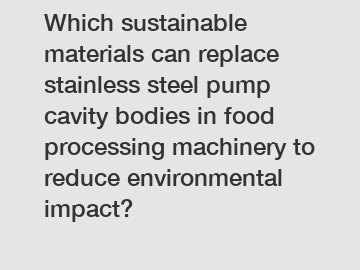Which sustainable materials can replace stainless steel pump cavity bodies in food processing machinery to reduce environmental impact?
In today's rapidly evolving world, sustainability has become increasingly important across all sectors, including food processing. As we strive to reduce the environmental impact of our daily practices, it is crucial to identify alternative materials that can replace stainless steel pump cavity bodies in food processing machinery. By adopting sustainable alternatives, we can minimize our ecological footprint without compromising on safety or efficiency. In this article, we will delve into some promising materials that possess the potential to revolutionize the industry.
1. Aluminum: .
With its impressive strength-to-weight ratio, aluminum is a viable alternative to stainless steel. This lightweight material requires fewer natural resources during production and reduces energy consumption during transportation. Though aluminum is susceptible to corrosion, advancements in protective coatings and finishes have significantly improved its durability. Furthermore, aluminum can be recycled repeatedly without compromising its mechanical properties, making it an appealing choice for reducing environmental impact.

2. Composite Materials:
Composites, typically formed by combining two or more materials, are gaining recognition as sustainable choices for pump cavity bodies. By incorporating renewable fibers such as jute, hemp, or bamboo with bio-based resins, manufacturers can create robust and eco-friendly components. These composites offer excellent strength while reducing the overall weight of machinery, lowering energy consumption, and providing better resistance to corrosion and wear.
3. Biodegradable Polymers:
The emergence of biodegradable polymers, derived from renewable sources like corn or sugarcane, presents a promising solution for reducing the environmental burden. These polymers possess comparable strength and durability to stainless steel while being biodegradable under specific conditions. Incorporating biodegradable polymers in pump cavity bodies enables easy composting at the end of their lifecycle, resulting in minimal waste and reduced environmental impact.
4. Glass-Reinforced Resins:
Another intriguing alternative is glass-reinforced resins, which combine the mechanical properties of glass fibers with the moldability and versatility of various resins. These materials offer excellent chemical resistance, dimensional stability, and insulation properties. Glass-reinforced resins can be molded into intricate shapes, making them suitable for complex pump cavity designs. Additionally, their inherent recyclability minimizes waste and makes them a greener choice for food processing machinery.
5. Ceramic Composites:
Ceramic composites are being explored as an alternative to stainless steel due to their exceptional strength, high temperature resistance, and resilience to wear and corrosion. Ceramic-based materials provide an attractive solution for food processing applications that involve aggressive chemicals or high-temperature environments. While they may require specialized manufacturing techniques, ceramic composites hold incredible potential in designing efficient, sustainable pump cavity bodies.
Conclusion:
As the demand for sustainable practices in the food processing industry surges, the search for alternatives to stainless steel pump cavity bodies intensifies. While stainless steel has long been regarded as the standard due to its strength and durability, exploring sustainable materials can lead to reduced environmental impact without compromising on performance. Materials like aluminum, composites, biodegradable polymers, glass-reinforced resins, and ceramic composites offer exciting possibilities for manufacturers to create efficient, eco-friendly pump cavity bodies. By embracing these sustainable alternatives, the industry can march towards a greener future, achieving a harmonious balance between productivity and environmental responsibility.
Are you interested in learning more about 3 Way Ball Valve Supplier, Three Way Ball Valve China, Small Ball Valve Wholesale? Contact us today to secure an expert consultation!
190
0
0

Comments
All Comments (0)